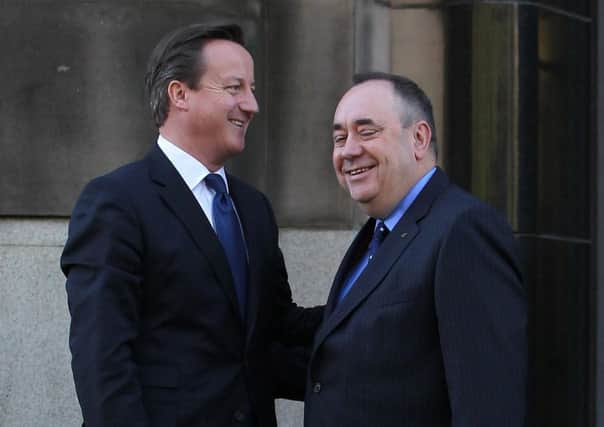Tom Peterkin: The secret of successful politics: it's all in the timing


As the wind blasted in from the North Sea, I cursed my rotten golf in time-honoured fashion and lamented the disastrous consequences of a misfiring golf swing.
Amid the torrent of foul language and a golf ball hunt conducted more in hope than expectation, the thought came to me that in politics, like golf, timing is everything.
Advertisement
Hide AdAdvertisement
Hide AdJust as a snatched, ill-timed golf shots leads to wild slices and duck hooks, losing control of political events leads to a loss of control over political destiny.
This was apparent during the Scottish independence referendum, when the suspicion was that unforeseen circumstances had forced Alex Salmond into holding the vote long before he was certain that he would win.
The SNP had defied the odds in the 2011 Scottish election and won a landslide victory which most unexpectedly made Salmond the leader of a majority government.
This surprising result made an independence referendum inevitable. The SNP had campaigned in the 2011 election on a manifesto which made an explicit pledge to put an independence vote to the country. (Given that the SNP’s reason for existence happens to be Scottish independence, the party could hardly have done otherwise).
But it was the astonishing achievement of the SNP of getting itself in a position where its referendum policy could no longer be blocked by the combined efforts of the opposition that made staging the 2014 vote inevitable. The scale of the SNP’s victory and its implications surprised the party’s strategists, who in an ideal world would rather have waited until the base support for independence was a good bit higher.
In any case, the SNP threw everything they had at the Yes campaign. Although the Yes campaign managed to drive support up from about one third to 45 per cent, the vote came too soon.
Although there were stages during the campaign when Salmond was convinced he would win, the issue of timing would crop up at a critical moment.
Fittingly, it was when the then SNP leader was on the golf course. Salmond was having a round at Castle Stuart on the Moray Firth when news of poll was relayed to him by his adviser Geoff Aberdein.
Advertisement
Hide AdAdvertisement
Hide AdIt was just two weeks out from the big vote and the polls were tightening. Salmond was informed by Aberdein that the numbers were now 51 per cent to 49 per cent.
Salmond wrongly assumed that Aberdein meant that it was 51 per cent in favour of No, but was relaxed because that was exactly where he wanted to be ahead of one big final push.
Then he was corrected and told that, in fact, the Sunday newspaper poll was the first to put support for independence ahead of the status quo and it was actually 51 per cent for Yes.
“Damn. It’s a week too soon,” Salmond said. The then First Minister knew the timing was out. Sure enough, the shock of a poll favouring Yes saw support drift back to No in the days leading up to the referendum.
It can be argued that David Cameron found himself in a similar position with the Brexit vote. His great achievement in delivering the first Conservative majority government in two decades made his manifesto promise of an EU referendum a reality. For Cameron, like Salmond, it did not end well.
Attempting to take control of political timing can be seductive for political leaders. In 2008, Wendy Alexander attempted to grab the initiative by calling Salmond’s bluff.
In a dramatic reversal of Labour policy, Alexander called on Salmond to “bring it on” by urging a snap referendum on Scottish independence. Alexander’s bold assertion that she did not fear the verdict of the Scottish people ostensibly removed a key obstacle to the SNP’s referendum ambitions.
Her bold assertion was based on her analysis that forcing the issue would result in a vote that was too early for the SNP to have any hope of building enough support to win.
Advertisement
Hide AdAdvertisement
Hide AdWith the benefit of hindsight, it looks now as if Alexander’s proposal to lance the independence boil could have worked from a Unionist point of view. The assumption is that it would have delivered a comfortable No vote and thereby denied the SNP the chance to build the sort of momentum it had gathered by 18 September 2014.
In the end, Alexander’s proposal fizzled out when the then Prime Minister Gordon Brown failed to back her, and her own career as Scottish Labour leader bit the dust.
The possibility of losing control over the timing of key political events must also be pre-occupying Nicola Sturgeon. Having raised the prospect of a second independence referendum in the aftermath of the Brexit vote, she has set herself a tight timetable. Given the challenging economic conditions, there are enormous question marks over whether she can build enough support in that time.
The worst case scenario for the First Minister is to call a referendum that she loses and thus kills her independence dream. Rather like the golfer who stands on a windswept tee while struggling to find any rhythm, Sturgeon must have her own worries about timing.